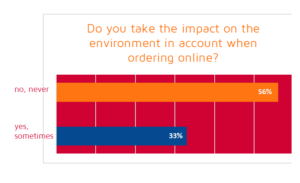The increasing number of online purchases also causes an increase in deliveries, delivery options, and higher consumer expectations. Extra pressure is being put on the already complex last mile. To overcome this pressure, new initiatives are being developed, including the concept of Green and Social Delivery.
If you are interested in the current trends and consumer attitudes in the field of sustainable and social deliveries, download your free report by B2C Europe now.
Some results from the study:
- Of the consumers who prefer online shopping instead of conventional shopping, the vast majority (78%) prefers online shopping with home delivery and 22% prefer online shopping with pick-up point delivery. The reason for this could be that the consumer is becoming more demanding: the parcel is expected to come to the consumer instead of the other way around. However, delivering at a pick-up point is more sustainable, because fewer vehicle trips are needed.
- Though more than half of online shoppers (59%) are somewhat to very concerned about the impact on the environment when ordering online, only a third sometimes take the impact on the environment into account when ordering online.
- There is clear willingness though by consumers to make sustainable shopping choices, this is apparent from the fact that more than half of the online shoppers (60%) are prepared to pay extra for sustainable delivery methods. However, the researchers did NOT ask what the extra pay could, or should, be.
- When explained that a shorter delivery period results in more traffic and air pollution, only 10% of online shoppers choose the express delivery 1-2 days. A significant percentage chose either green delivery 6-8 days (43%) or standard delivery 3-5 days (42%).
- Social delivery also provides a social function. With all sorts of innovative technologies, it is becoming less and less necessary to have personal contact with others. The result is that society is becoming individualized. At the same time, this society is an aging one. Social delivery offers an opportunity to get in touch with local residents and to help others out. Research from B2C Europe shows that more than half of online shoppers (55%) would be willing to accept parcels for their neighbors’ more often if they knew this would help out their neighbors. A third (34%) would if they knew this would help the delivery person and 39% also would if they knew that their neighbors would do the same for them. Only 10% would accept more parcels if they would receive compensation for this.
E-commerce is a fast-growing market, but its future depends on how well the industry adopts new ways of doing things. According to B2C Europe, or a more sustainable and social future, it’s important that awareness is created together with the provision of sustainable delivery options. Providing information about the environmental impact of delivery decisions for example during check-out can lead to consumers becoming more conscious of their online shopping behavior.
Source: B2C Europe


It’s great that you are getting thoughts from this
post as well as from our argument made at this place. http://mobile.itsbetter.com/gourl/?url=http://www.mbet88vn.com